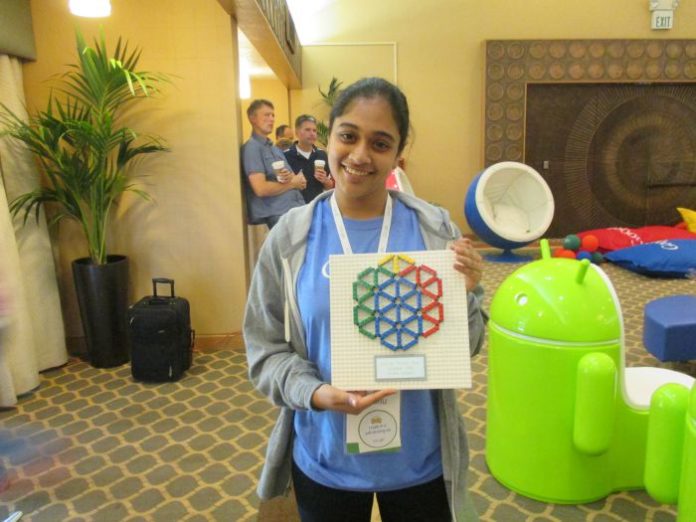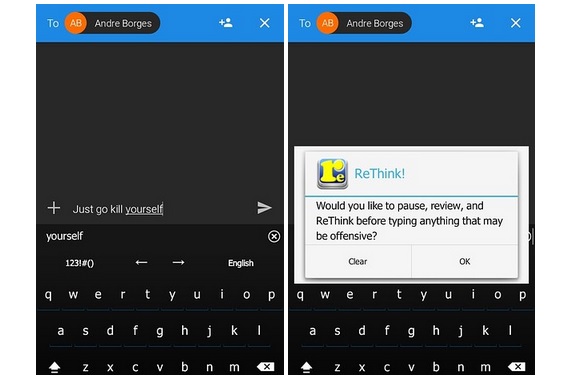
Shocked, heartbroken, and angered by the suicide of an 11-year-old cyberbullying victim in October 2013, then 13-year-old Trisha Prabhu, a student of Neuqua Valley High School in Naperville, Illinois, decided to end online harassment and humiliation of children and teenagers at its source.
Her efforts to find a long-term solution to cyberbullying led Trisha to create Rethink, a Software system that impels potential bullies to think twice before posting abusive, mean, or hurtful messages — such as you’re fat, you’re short, you’re ugly, and you’re a loser— on social media and hence, the consequent repercussion.
Brava, Trisha! Brava, @smrtgrls How Trisha Prabhu is Curbing Cyberbullying https://t.co/3xVFmnkD47 #Rethink
— J. Smith-Cameron (@j_smithcameron) June 6, 2016
Trisha, who won a spot as a Google Science Fair 2014 Global Finalist, told Take Part:
“For me, it really started in the fall of 2013 [when I read about] this horrible article about this young girl who’s 11 who jumps off her town’s water tower to her death, all because she’d been cyberbullied. [I wondered] Why aren’t there more effective ways to stop this silent pandemic from spreading? Why aren’t there proactive solutions, and why is [cyberbullying] becoming socially acceptable? I was thinking, why are we even letting this happen? We should stop cyberbullying before it happens, before the damage is done, before the victim feels hurt.”
The app has a text-recognition feature — built with a list of offensive terms registered with the Cyberbullying Research Centre — that displays a pop-up window urging the user to reconsider sending a potentially offensive message. Trisha, who started coding at 10, told ABC News:
“ReThink is able to detect when someone tries to post something offensive on social media and then alert that person and go, ‘Whoa. Hold on. Are you really sure you want to post message? It could be offensive’. We’re giving them a chance to rethink their decision, at which point they can either hit clear, ‘Maybe I do want to think about this’, or they can go ahead and decide that they want to post the message.”
ReThink is patented software; it just does not act on trigger words, said Trisha. There is a difference when someone says “I hate this weather” vs. “I hate you”. While both contain the word “hate”, one could be hurtful and another not really. ReThink’s sophisticated algorithm recognizes hurtful words intelligently and acts upon it, she added.
Prior to her Rethink project, Trisha researched the brain’s role in the cognitive distraction that causes distracted driving. She explained on Hannah Alper’s blog:
“During my research, I came across an interesting article. If I was to summarize, it said “Adolescent brain is likened to a car with no brakes”. No pausing! No Thinking! Just acting! It’s all too well known that adolescents make impulsive, rash decisions. I further researched on this topic to identify why adolescents make impulsive decisions. There is a part of the brain called pre-frontal cortex.
“It is the part that controls decision-making and is not fully developed until age 25. That is when I wondered, could this relate to adolescents behavior on social media too? What if I gave adolescents a second chance to reconsider their decision before posting a hurtful message? Would they change their minds?”
According to stopcyberbullying.gov, cyberbullying is when an adolescent (ages 12-18) is tormented, harassed or embarrassed using the Internet and interactive technologies (social media sites). According to the US Department of Health and Human Services, Bureau of Justice Statistics and Cyberbullying Research Center, in comparison to a percentage of 37% of students who reported being physically bullied at school, 52% students have reported being cyber bullied.
While some of the popular social media sites try to prevent cyber-bullying after bullying has happened, Trisha wanted to design a system that would foil cyber-bullying by preventing wicked comments from being posted. When she tested ReThink prototype on 1500 adolescents, adolescents changed their minds and decided not to post nasty, insensitive or spiteful messages over 93% of the time.
“The Prefrontal Cortex is not fully developed during adolescence years and the best way to combat this issue is to teach adolescents four steps in decision making:
1. The Situation: Adolescents need to realize they need to stop/think in an important situation
2. Think: Adolescents need to think about the possible choices/consequences in a situation
3. Their Decision: Adolescents need to decide what to do
4. Evaluate their Decision: (Later) Adolescents evaluate whether they could’ve made a better decision.”
Last year, Trisha was among the 100 students invited from across the country to the fifth-ever White House Science Fair, to share their projects and celebrate their extraordinary science, technology, engineering, and math (STEM) achievements at the White House.
This Article (15-Year-Old Illinois Girl Develops App To Prevent Cyberbullying) is free and open source. You have permission to republish this article under a Creative Commons license with attribution to the author and AnonHQ.com.





